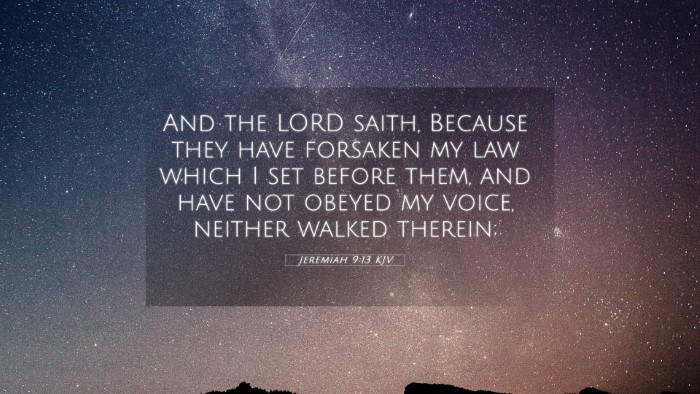Understanding Jeremiah 9:13
Jeremiah 9:13 states: “And the LORD said, Because they have forsaken my law which I set before them, and have not obeyed my voice, neither walked therein.” This verse serves as a profound declaration of the consequences that arise from the disobedience of God’s commands. Through this commentary summary, we will explore its meaning through various public domain commentaries, including those by Matthew Henry, Albert Barnes, and Adam Clarke.
Verse Context and Themes
This verse is situated within a broader context where the Prophet Jeremiah is addressing the people of Judah about their moral decay and spiritual abandonment. The primary themes highlighted in this passage include:
- Forsaking God’s Law: The law represents God’s guidance and will for His people.
- Consequences of Disobedience: The verse indicates that turning away from divine instruction results in dire consequences.
- God’s Voice: The importance of listening and adhering to the voice of God is emphasized.
Commentary Insights
Commentaries provide rich insights into the verse and elucidate its meaning further:
Matthew Henry's Commentary
Matthew Henry elaborates on the notion of forsaking God’s law as a serious sin. He postulates that the Israelites forgot the divine statutes that were laid before them, resulting in their corruption and moral decline. He underscores that their failure to follow the Lord’s voice leads not only to personal downfall but also to communal disaster. Henry emphasizes repentance as a vital step back to divine favor.
Albert Barnes' Notes
Albert Barnes provides additional context by explaining that the Israelites had not just merely ignored the law but had actively rejected it, choosing their path over God’s guidance. Barnes points to the critical act of 'walking' in God’s way as essential to spiritual health and societal stability, and notes the dire implications of turning away from it. He suggests that this neglect is a rejection of God Himself, leading to inevitable judgment.
Adam Clarke's Commentary
Adam Clarke comments on the grievous nature of the sin being addressed. He notes that the Israelites had not only forsaken the law but had blatantly ignored God's commandments. Clarke stresses the relationship between God's law and the welfare of the people, asserting that true prosperity lies in adherence to divine instruction. He views this rebellious attitude as a major cause of the calamities that befell the nation.
Bible Verse Cross-References
This verse can be cross-referenced with several other Biblical texts that enhance its interpretation and thematic elements:
- Deuteronomy 31:16-17: Highlights Israel's history of turning away from God.
- Proverbs 28:9: Discusses the consequences of turning away from the law.
- Isaiah 1:19-20: Encourages obedience to God's commands.
- Hebrews 2:1-3: Warns against neglecting salvation.
- Romans 2:13: Stresses the importance of being doers of the law.
- 2 Chronicles 15:3: Depicts the outcomes of forsaking the Lord.
- James 1:22: Encourages believers to be doers of the word.
- Matthew 7:24-27: Illustrates the wise who builds his house on the rock of God's teachings.
- John 14:21: Explains the love demonstrated through obedience to God's commandments.
- Ezekiel 18:30: Calls for turning from offenses to live.
Connecting Themes and Ideas
The themes found in Jeremiah 9:13 resonate throughout the Scriptures, showcasing a consistent message regarding the importance of obedience to God's commands and the grave implications of turning away from Him. One can find connections within both the Old and New Testaments which affirm the significance of living according to God's word:
- Links between the Prophets and Apostolic Teachings: The call to obedience is a recurring theme.
- Comparative study of Pauline Epistles: The spiritual implications of following God’s instructions are discussed in various letters.
- Cross-referencing Psalms with New Testament Teachings: Many psalms emphasize the need for righteousness and the dangers of neglecting God’s guidelines.
Tools for Bible Cross-Referencing
For those interested in exploring Bible verse cross-references, numerous tools exist that can facilitate this process:
- Bible Concordance: A systematic listing of words and topics found in the Bible.
- Bible Cross-Reference Guide: A resource outlining corresponding scriptures.
- Cross-Reference Bible Study: Techniques to delve deeper into scriptural connections.
- Bible Chain References: A method of linking verses thematically.
Conclusion
In conclusion, Jeremiah 9:13 serves as a powerful reminder of the significance of following divine guidance and the dangers that arise from disobedience. The commentaries by Matthew Henry, Albert Barnes, and Adam Clarke collectively illustrate the spiritual implications of forsaking God’s law, framing it within the larger narrative of God’s relationship with His people. Understanding passages like this one through comparative Bible verse analysis and thematic connections enriches our spiritual insight, encouraging deeper study and reflection.










